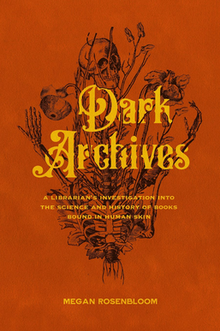 | |
| Author | Megan Rosenbloom |
|---|---|
| Publisher | Farrar, Straus and Giroux |
Publication date | October 2020 |
| Pages | 288 |
| ISBN | 978-0-374-13470-9 |
| 002 | |
Dark Archives: A Librarian's Investigation into the Science and History of Books Bound in Human Skin is a 2020 non-fiction book by the medical librarian and death-positive advocate Megan Rosenbloom. Dealing with anthropodermic bibliopegy, the binding of books in human skin, it expounds upon Rosenbloom's research on such books and their historical, ethical, and cultural implications.
The book focuses on the relationship between anthropodermic bibliopegy and the history of medicine; most confirmed cases of such books were created or owned by medical professionals, in contrast to common stereotypes that they were associated with Nazi Germany, serial killers, or the French Revolution. Rosenbloom discusses how the practice reflects the changing attitudes towards consent, ownership, and disposal of human bodies, and how the history of anthropodermic books intertwines with the history of medical ethics as a field. She interviews librarians, archivists, collectors, and experts on the topic, and examines notable examples of such books and their origins. Though Rosenbloom supports the preservation and maintenance of anthropodermic books, Dark Archives also covers arguments to the contrary, such as those espoused by Princeton University Library senior librarian Paul Needham.
Dark Archives was published by Farrar, Straus and Giroux in October 2020. Critics praised the book for its thorough research, clear writing, and enthusiasm for rare books and their history. The perspective and history through which Rosenbloom approached the subject matter also attracted attention, some reviewers commending it and others questioning its sensitivity. Rosenbloom is one of the key figures in the death-positive movement; her philosophical affiliation with open discussions of mortality and opposition to death taboos is considered a core influence on her approach to anthropodermic books.